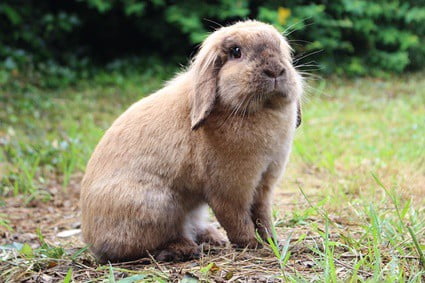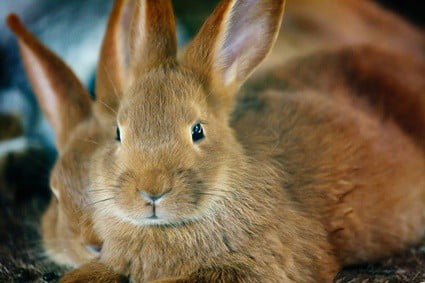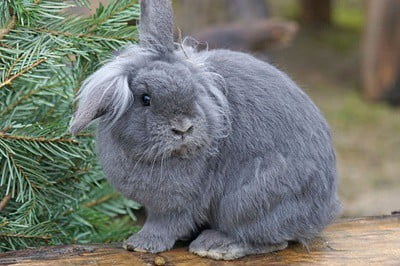Rabbits can bite their owners for good and bad reasons. It isn’t uncommon for your rabbit to bite or nip, but it should always be addressed. This behavior is most often a fear response or the rabbit acting territorially. In both cases, the aggressive behavior should be dealt with. Otherwise, the rabbit may grow more defensive or experience unnecessary stress.
Rabbits bite their owners because of food aggression, sexual maturity, self-defense, boredom, and dominance. For the most part, bites are situational and are sparked by specific stressors. Resolving the biting, or nipping, requires identifying what those stressors are and removing them. Alternatively, you can teach your rabbit to stop biting and nipping at you. Never resort to disciplining the rabbit, however, as this will ruin your bond.
Likewise, be careful of sneaking up on the bunny or reaching into its hutch unexpectedly. That’s because rabbits use bites and nips as a way to communicate. A bite can mean “go away” or “this is my food” or “I am scared.” Nips can have both positive and negative messages. It can be affectionate grooming behavior, a call for play or attention, or a warning preceding a bite.
Why Do Rabbits Bite You?
If your bunny takes an unexpected bite out of you, there’s usually a clear purpose. Rabbits bite for these main reasons:
- Self-defense
- Food aggression
- Sexual maturity
- Boredom
- Dominance
Rabbits also nip. This is a less severe (but still potentially painful) version of a bite. Usually, rabbit nipping means something in the realm of affection or “I want attention.” It can also be a gentle warning preceding a harder bite.
Is My Rabbit Biting Me A Bad Sign?
Rabbit biting is problematic and unusual. If left unchecked, this behavior can become quite destructive and disruptive. Gone is your sweet and cuddly rabbit. In its place is an aggressive animal that shuns affection and wants nothing to do with you.
As such, it’s important to uncover the reason for your rabbit’s change in behavior. That’s because it can:
- Indicate changes that are needed in the rabbit’s life.
- Reveal changes that you need to make in how you interact with the rabbit.
Rabbits are not naturally aggressive animals. These are animals that very much prefer to flee over fight. Biting is a last resort in most cases.
Conversely, rabbit nipping is a more common behavior. It can be annoying, and training the rabbit to stop requires understanding its reasons for nipping. At its most basic level, biting is the rabbit communicating with you, and you need to listen. Not listening can lead to the behavioral problems worsening, and an unpleasant relationship with your rabbit.

Why Is My Rabbit Biting Me All Of A Sudden?
It can be shocking if your rabbit bites you without warning. Since bunnies aren’t naturally aggressive animals, it’s disheartening to have your sweet pet act in such a manner. Thankfully, there are clear answers for your rabbit’s changing attitude.
These situations, and others, can easily spark a defensive or territorial bite.
You’ve Startled The Bunny
Aggression in rabbits is almost always a fear response. Biting is a defensive act, and realizing that can make owners feel guilty. Unintentional as it probably is, you may be frightening your rabbit to the point where it feels it has to defend itself. Other behaviors you may see alongside biting are:
- Lunging
- Grunting
- Open-mouth displays
Naturally, a rabbit that feels cornered will be more anxious, especially if boxed in by an approaching human. If it is unable to retreat, it may bite defensively. The same goes for when a rabbit is confined to a cage or hutch without a secondary exit.
Being surprised by their owners can trick rabbits into acting defensively out of pure reflex. As prey animals, rabbits are very high-strung. They rely heavily on the fight or flight response. If a bunny is unaware of your presence and is startled by your touch, it may turn and bite you reflexively.
The Bunny Is Protective Its Territory Or Kits
Even if your rabbit feels safe, it may display territorial behavior. When defending its area, it may bite anything it wants to back off. That’s especially true for a doe with kits if you come too close to her nest.
In general, rabbits can be territorial about their foot, cage, or toys. Even a fully bonded rabbit may bite at its owners if they touch what a rabbit deems as its own. Reaching inside the hutch or cage for the bunny will likely cause it to bite you in warning. The same goes for stepping into the enclosure to clean or change out the litter box. The enclosure is the rabbit’s safe place, and it will defend it jealously.
Likewise, pregnant or nursing rabbits will be very defensive of their nests and young. A pregnant doe passing through the final days of gestation will build a nest. Reproduction notes that rabbits build two types of nest: one using available materials, like straw, and another using the doe’s own fur. We would suggest a third type, which is a combination of both. During the nest-building point of gestation, females can act defensively.
The Rabbit Wants Dominance
A sudden bout of biting can also be sparked by the bunny reaching sexual maturity. This introduces changes in a rabbit’s body, and triggers new habits and behaviors. When a rabbit’s system is flush with hormones, it has urges and restless energy. Should it be unable to expend said energy, it will channel it through destructive and potentially aggressive acts. These include biting you.
Likewise, the rabbit may now believe itself to be the dominant individual of the household. To test out how much space this new sexual maturity has bought it, it may bite you. The nipping could be sudden and seemingly without cause. The rabbit’s territorial behavior will likely increase during this time. It may grow defensive of its cage or toys.
Consider the age of your rabbit. Nearly all breeds will reach sexual maturity at between 3-6 months of age. Once the rabbit is 4 months old, it is old enough to be neutered.
The Rabbit Is Bored
Boredom causes a number of problems and destructive behaviors, one of which is biting. A rabbit that feels unfulfilled will become bored and depressed. It will turn this unspent energy to available stimuli and act out. This may result in spraying, chewing on furniture, and aggressive behavior.
As intelligent animals with no small amount of energy, rabbits need plenty of enrichment and exercise. Resolving boredom requires reassessing the needs of your rabbit and meeting them. Certain breeds have lots of energy and love to play. Others are more laid back, but still need enrichment. Be sure to research the specific needs of your rabbit’s breed.
Once you know how much playtime and exercise your rabbit needs, you can adjust its environment and playtime. You can start by:
- Investing in toys, play tunnels, rabbit-friendly platforms.
- Playing with your rabbit.
- Allowing the rabbit free-roam time.
The goal is to ensure your rabbit can expend its energy productively.
How To Keep a Rabbit from Biting You
Defensive, territorial, and warning bites are all concerning. You can’t have a rabbit that attacks or injures you, of course. Should the rabbit continue biting you, it’s important to adjust how you interact with it.
Approach The Rabbit Openly
Always ensure that the rabbit is aware of you before getting too close. Doing so will allow it to register the presence as you and not a threat. Announce your presence, if it isn’t already looking at you, by softly calling its name.
Once the rabbit acknowledges you, you can approach. However, if the rabbit is in its cage or enclosure, allow it to approach you instead. By doing this, you’re letting the rabbit decide what happens next. This both draws the rabbit from places where it may be territorial, and signals it’s receptive to cuddles.
When you reach for the rabbit, do so on its level and with predictable movements.
Prevent The Rabbit From Claiming Territory
What if a territorial rabbit is biting or nipping at you while you’re cleaning its enclosure? What if you can’t refresh its food or else get nipped? There are two steps that you can take:
- Moving the litterbox out of its territory radius
- Moving its food and water dish around to different locations in the pen
Taking these steps prevents the rabbit from solidifying these places as its own and only its own. You can also move the rabbit to a separate room as you clean.
Don’t Interfere with Rabbit Nests
For pregnant and nursing does, it’s best to leave the nests alone if the doe appears stressed by your proximity.
This only changes if you’re concerned for the health of the kits or doe. In that case, you may be forced to approach regardless of the biting. Just be sure to wear protective coverings on your hands. Speak in a calm voice and try to move in slow, methodical movements.
Neutering Your Rabbit To Prevent Biting
Getting your rabbit neutered does more than prevent any unwanted litters. It can prevent many undesirable behaviors, including biting. Once your rabbit is old enough to be neutered, you can reach out to your vet.
Once the operation is performed, your rabbit will need a short recovery time. After this, you should notice the pet growing more docile and less prone to biting.
Be aware than dwarf rabbit breeds will occasionally be neutered at a slightly later age. This allows the rabbit to grow further and put on more weight. As such, it decreases the chances of complications during surgery and recovery. During this time, the rabbit may act differently, and you should keep it separated from rabbits of the opposite sex.
Be warned that rabbits may still exhibit biting and other unpleasant behaviors for a short period after being neutered. It may also become worse before it gets better. Discuss this with your vet beforehand if you are concerned.
Rabbits Biting Out of Food Aggression
Food aggression is surprisingly common in rabbits. Biting and food-guarding go hand in hand. A food aggressive rabbit may bite you or other pets that approach its food.
Applied Animal Behavior Science notes that concentrated food supplies may promote aggression in captive-bred rabbits. This is because the rabbits may feel that nutrients are limited.
They need to protect what they can. Likewise, set feeding times and feeding too much high-value food, like pellets and treats, can motivate territorial behavior. The method for taming down food aggression is multi-fold:
- Swap the rabbit’s bowl for a flatter feeding tray
- Reduce the number of pellets and treat food offered
- Don’t stick to a rigid feeding schedule for these types of food
- Always ensure that the rabbit has access to its regular hay, but offer it pellets and treats at random times during the day
Do Rabbits Bite Hard?
The structure of a rabbit’s jaw is suited to an herbivorous diet. To complement the variety of teeth needed for chewing up food, rabbits have surprising bite strength. Although it’s not as powerful as previously estimated, as noted by the Journal of the Royal Society Interface, rabbit bites can break the skin.
A rabbit’s front teeth have a shearing effect. Behind those teeth is an intricate network of muscle. The rabbit will put this to good use if it bites you.
A nip is an intentionally soft bite. Depending on the reason for the nip, it may feel like a dull or sharp pinch. A small bruise or constellation of broken capillaries may result.
A true bite, with the intent to hurt, will likely break the skin. That will result in a small but bloody wound. It also may not break the skin and remain as a deeper bruise.
Rabbits bite as hard as they feel they need to. A bunny terrified for its life will bite hard and fast. In contrast, a rabbit telling you it wants attention will only lightly nip at your hand.
Do Rabbits Nip To Show Affection?
Nipping is done to display four main intentions:
Grooming
Nipping is an intrinsic part of grooming. With a rabbit’s complex social behavior, part of how it displays love or care is through grooming. Gentle nipping is a part of this process. If you observe your rabbit grooming, you may see it nipping at its fur. This removes loose hair, dirt, and tangled fur.
During petting sessions, you may be on the receiving end of nipping. This is the rabbit returning the favor, as it were, and grooming you in return.
Requesting Cuddles
The bunny may also nip you when it’s nuzzling into your lap. That’s a way of saying “I like you” or “I would like cuddles now.”
Demanding Attention
Nipping is also common from dominant rabbits. Such rabbits will use nipping as a way of reminding everyone else who is in charge. As the leader, it demands (and expects to receive) attention.
Asking To Be Left Alone
A nip may also be the rabbit telling you “I’ve had enough.” The bunny has enjoyed its fill of social time and wishes to be alone. The nip may become a bite if you don’t listen.

Why Do Rabbits Bite Your Feet?
Rabbits bite at your feet because it’s often the most accessible place for them to do so.
As you move around a territorial rabbit’s enclosure, it may nip at your heels and toes. If you ignore it, it may bite harder. At this point, you should remove the rabbit from the enclosure and place it in another room. This allows you to clean in peace.
Rabbits that have reached sexual maturity may also run circles around your feet. This is a sign of courtship. The rabbit may nip at your heels as a sign of affection. Getting the rabbit neutered should resolve the issue.
Why Do Rabbits Bite Your Hands?
A rabbit will bite your hands depending on the situation:
My Rabbit Bites My Hands When I Pick It Up
One situation is when owners are reaching to pick up their rabbit and it suddenly bites them. There are three explanations for this. You have:
- Startled the rabbit
- Encroached on its territory
- Reached its limit for social time
Remember, bunnies are easily startled. So, if you spook the rabbit by touching it or trying to pick it up, obviously your hand is in easy reach. It will bite your palm, fingers, or anywhere it can reach.
This also applies to breaching a rabbit’s territory by placing a hand inside its hutch. Back away and let the rabbit come to you.
My Rabbit Bites My Hands When I Hold It
Rabbits like spending time with those they’re bonded to. Equally, they enjoy alone time. Once a rabbit has decided “that’s enough cuddles,” it will signal to you that it wants to go free. If you restrain it, it may nip or bite at you.
Being restrained itself is quite stressful for a rabbit. This mimics being trapped or caught by a predatory animal. Allow the rabbit to set boundaries for social and solitary time.
My Rabbit Bites My Hands for No Reason
What if none of the above situations apply? Then the rabbit may bite your hand because it’s not well-bonded.
Rabbits need to trust their owners. Without this trust, the rabbit will not form a strong connection with you. It will not be willing to socialize with you or offer and receive affection. The solution is to build a loving bond.
Why Do Rabbits Bite Your Clothes?
Rabbits may bite or chew at your clothes as a way of saying “play with me.” Likewise, a rabbit will nip and tug at the looser folds of your clothes or dig at your lap.
Remember that playing with a rabbit means getting down on its level. In this case, the bunny is literally asking you to hop on the floor and break out the toys. If you can, try to comply. In the least, acknowledge the rabbit affectionately, so that it doesn’t feel rejected.
How Can I Train My Rabbit To Stop Biting?
Teaching your rabbit to not bite relies on patience and consistency. Bunnies are intelligent, but they still require time for the lessons to sink in. Here are a few approaches you can take, and one route you definitely shouldn’t.
Squeal At The Rabbit
Training your rabbit to stop nipping and biting will mean practicing your rabbit squeal. Or something close to it.
The dreaded rabbit scream is a sign of pain and fear. Mimicking a high-pitched noise, like a squeal, is a way to essentially speak rabbit. When your rabbit nips or bites you, make this noise. It will learn that it is hurting you.
Do this multiple times, and the rabbit will either cease biting you or softening its nips.
Press The Rabbit’s Head Down
Dominant rabbits must be taught that they aren’t actually the boss. However, this must be done carefully.
When training, do not reward the rabbit for its biting by shying away. Instead, you need to establish yourself as the boss. Use a combination of the above method and a dominance exercise:
- Very gently place your hand on the rabbit’s head
- Press it slightly to the floor
- Hold it for a few seconds
- Let the rabbit’s head up again
This will only work if the rabbit is biting you for social hierarchy reasons. Never punish your rabbit by swatting it or raising your voice. This destroys trust. Instead, apply consistent and constructive discipline.

